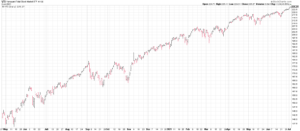MARKET RECAP
US stocks continued their march forward, closing at a new high on Friday, up 1.22% for the week. International stocks fell by 0.87%. The S&P 500 has set a new high for seven days in a row, the longest such streak since 1997, and it has gained more than 5% for for five quarters in a row, that was last done in 1954. Bonds rose by 0.57%.
Household wealth in the US increased by $13.5 trillion last year, a simply incredible number given that the economy was more or less shutdown at different points. A higher stock market drove half of the increase. One-third of the increase went to the top 1% and more than 70% went to the top 20% of income earners. Huge government benefits also drove the increase, especially for lower income workers. Higher prices for homes were also a factor.
In April, home prices increased by the fasted rate ever, up 14.6% year over year, as measured by the S&P CoreLogic Case-Shiller National Home Price Index. That was up from 13.3% the previous month. The index dates back to 1987. Exploding house prices makes it difficult for many to afford a home, especially first-time buyers. Not to mention, out of control prices for homes was a major factor leading to the 2007/08 collapse. Which makes one wonder why the Federal Reserve continues to buy $40 billion per month in mortgage securities while the economy is growing at a real rate of 7% and inflation is coming in at 4% plus.
Business added 850,000 jobs last month, better than the consensus estimate. Weekly jobless claims fell to a pandemic low last week, dropping to 364,000 down from 415,000 the prior week.
130 countries have agreed do a global minimum tax rate for international companies. The Biden administration pushed this plan. There will now be a 15% minimum tax rate in each country, thereby minimizing opportunities to avoid tax. It was the biggest change to international taxation rules in a century.
SCOREBOARD


